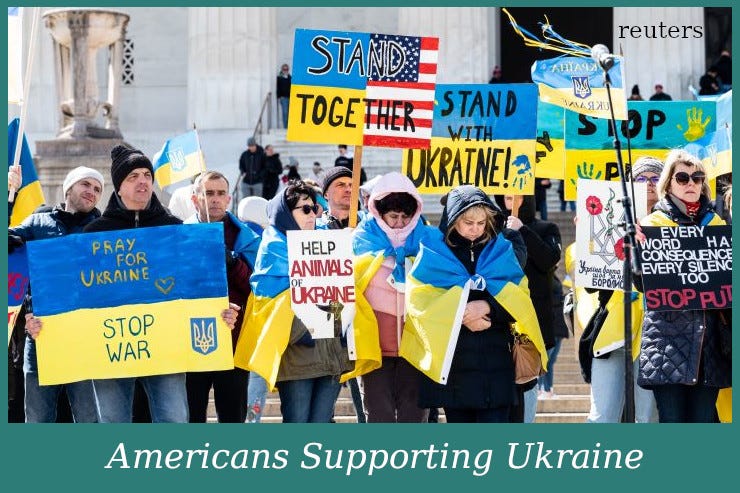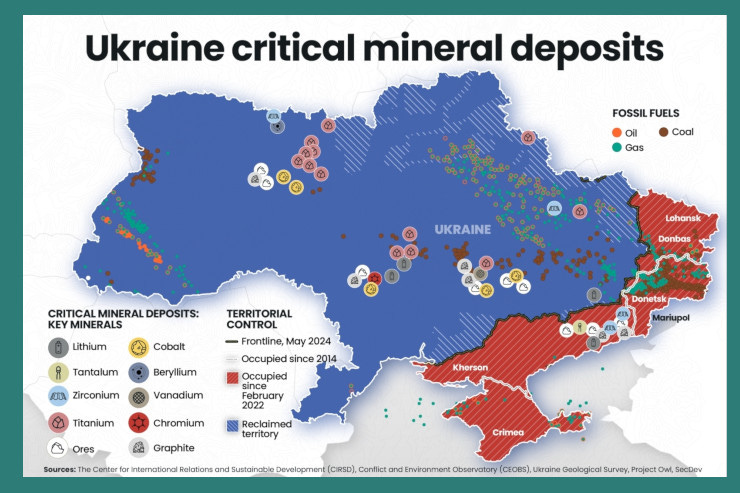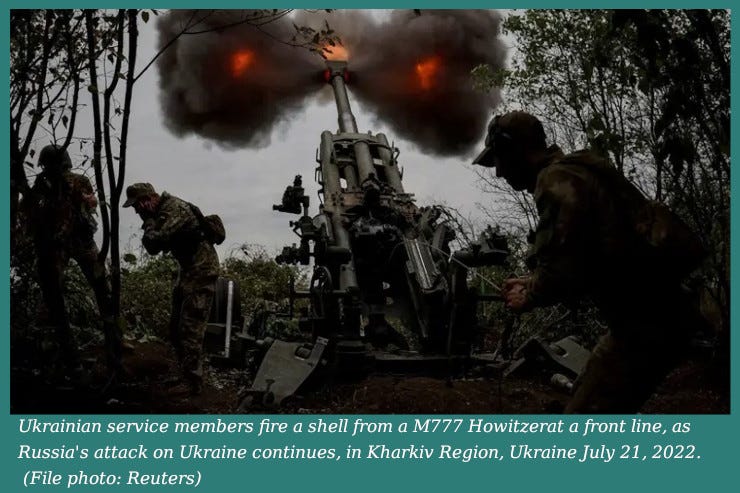A Bunch of Rocks
What the Ukraine War Is Really About
The Illusion of Morality
When the war in Ukraine started, the Western media snapped into place like clockwork. Overnight, Ukraine was the brave little democracy, standing tall against the big bad Russian bear. Ukraine flags everywhere. Hashtags. Teary-eyed speeches in Congress. All of a sudden, people who didn’t know where Ukraine was last week were calling it the frontline of freedom.
But that version of the truth was selectively edited. The inconvenient facts buried.
Because before the invasion, Ukraine wasn’t exactly the poster child for Western ideals. It was widely known, by its own citizens, by watchdogs, by anyone paying attention, as one of the most corrupt countries in Europe. Oligarchs ran the show. Politicians were bought and sold. Billions of dollars vanished through state contracts and shell companies, like magic tricks without the charm.
And beneath all that, something worse. Ukraine was a hub for human trafficking. That part rarely made the news, but it was real. Women promised work abroad were trafficked into exploitation. Children disappeared from orphanages, sold for god-knows-what sick fetishes. The authorities looked the other way, or in some cases, profited from it.
That didn’t go away when the bombs started falling. But it did disappear from the carefully crafted headlines.
Suddenly, Ukraine was spotless. A symbol. A pure cause the West could rally around. We weren’t defending a complicated, corrupt state, we were defending "freedom." We didn’t need nuance. Just a flag to wave.
Russia’s invasion was brutal. No one’s arguing that. But let’s not pretend this was good versus evil. It was power versus power. Interest versus interest. And a whole lot of truth got flattened along the way.
The Glitter Beneath the Soil
There’s a reason Ukraine suddenly became the hill to die on.
Not long ago, most Westerners couldn’t pick it out on a map. Now it was being hailed as the keystone of the free world. So what changed?
The answer wasn’t ideology. It was geology.
Beneath Ukraine’s battered landscape lies a motherlode of high-value materials: rare earths, lithium, titanium; exactly the kind of stuff a tech-hungry world is desperate for. These aren’t just rocks. They’re the bones of modern industry. Smartphones, missiles, electric cars, satellites, chips. The minerals Ukraine holds could fuel the next hundred years.
And more to the point: they could loosen China’s grip.
The U.S. knows it’s dangerously dependent on Chinese processing of rare earths. Ukraine offered a potential workaround. A treasure trove waiting to be extracted, refined, and locked into Western supply chains. But only if it could be pried loose of Russia’s orbit.
That’s why this wasn’t just a war over borders. It was a fight for access.
And then Trump said the quiet part out loud.
He made it clear: future aid to Ukraine would depend on handing over mineral rights. No more pretending. No more noble language. Just transactional geopolitics laid bare. We’ll help you fight, but we want the rocks.
It wasn’t a gaffe. It was a glimpse. A brief, unfiltered look at the real terms of the arrangement. And while critics clutched their pearls, no one truly denied the logic. Because deep down, everyone knew it was never just about freedom.
It was about what was in the ground.
Now the deal has gone through.
In 2025, the U.S. and Ukraine signed an economic agreement granting American access to Ukraine’s mineral reserves—lithium, titanium, rare earths. It was framed as a reconstruction fund, a partnership. But the message was clear: those minerals weren’t just valuable; they were leverage. Our aid was an investment. And we expect returns, whether or not we decide to stay at the table.
Some called it strategic. Others called it necessary.
But no one denied what it really was: compensation.
For the money. For the weapons. For the blood.
Empire by Other Means
Imagine this: Russia announces a new military alliance with Mexico. Starts sending weapons. Training troops. Talking about putting missile systems along the Rio Grande. Maybe opens a few “defensive” bases just south of El Paso.
How would the U.S. respond?
We’d call it an existential threat. We’d send troops. Threaten war. Probably start one.
That’s how Russia saw Ukraine.
Not as a democracy dreaming of freedom, but as a former Soviet republic sliding toward NATO, toward American hardware, American doctrine, American influence, right on their doorstep. It wasn’t paranoia. It was strategy.
NATO had crept east for decades. One country at a time. And despite all the promises made after the Cold War, the red line kept getting redrawn, closer and closer to Moscow. When Ukraine started drifting West, Russia warned repeatedly. The West ignored it. Or pretended not to hear.
Then came 2008, when NATO declared Ukraine would eventually join. That wasn’t just a signal. It was a countdown.
But when the invasion finally came, none of that context made it into the headlines. The narrative had to stay clean. So provocation was rebranded as protection. Strategic encirclement became “support for democracy.” And anyone who brought up NATO’s role was accused of apologizing for Putin.
The truth was messier than that. Russia understood what was buried beneath the rhetoric. They weren’t just fighting a border war. They were fighting to keep the mines. This wasn’t just empire versus empire. This was a resource war in disguise.
Biden himself, early on, said the U.S. wouldn’t send jets. Wouldn’t escalate.
But bit by bit, we went all in.
Abrams tanks. HIMARS. F-16s. Intelligence sharing. Special ops advisors. Each move framed as reluctant. Defensive. Just helping. Never provoking.
Fresh off the Kabul rooftop, no U.S. politician could sell a full‑throttle intervention.
Tanks and jets arrived in slow motion, just enough to keep the war alive, never enough to call it ours.
It wasn’t caution; It was optics. You can’t campaign on ‘another Afghanistan’, even if the rocks are worth it.
But if the shoe were on the other foot, we’d call it what it was: intervention by proxy. Empire by other means.
We may not have flown the planes or pulled the triggers. But we fueled the fire. And told ourselves it was righteous.
And perhaps, for some, it wasn’t just about democracy, it was about what lay beneath it.
The Meat Grinder
Over a million soldiers have been killed or wounded since this war began.
Roughly 700,000 Russian casualties.
Roughly 400,000 Ukrainian.
Tens of thousands missing. No graves. No answers.
And for what?
Not democracy. Not sovereignty. Not peace.
For rocks.
Rare earths. Lithium. Titanium. Strategic dirt with a flag on it.
At first, maybe we thought we could win. Maybe we believed the slogans, the analysts, the war room optimism.
That Russia would collapse under sanctions. That Ukraine, with enough weapons, would punch through.
But when victory slipped out of reach, we didn’t stop. We adapted. We let the war smolder, just hot enough to matter. Paused the aid. Signed the mineral deal. Then restarted the flow.
Not because we saw a path to peace. But because the war itself became useful. A way to keep the pressure on. A way to keep the minerals in play. A controlled burn. A negotiating tool. A distraction from the real prize buried in the soil.
We’re not fighting for Ukraine. We’re fighting for what’s under it.
And all the while, the young keep dying.
Ukrainian boys. Russian boys. Sent to the front for ideals their leaders didn’t even pretend to believe in anymore. Fed into the death machine because someone decided the dirt was worth it.
We called it a just war. A necessary stand.
But it was a fool’s errand. A slow-motion tragedy dressed in clean words. And the truth is buried in the same soil we wanted to claim.
No Good Guys, Only Interests
This war isn’t over.
It just stopped pretending to be about anything else.
The slogans have faded. The flags have tattered. The speeches are quieter.
But the game keeps going. Because the prize, the land and the riches beneath, haven’t been won yet.
The BRICS bloc (Brazil, Russia, India, China, South Africa) is rising. They’re consolidating power. Adding new members. Forming a new resource cartel in everything but name. And most people haven’t noticed the moment that changed everything.
They overtook the G7 in 2018. Not in headlines, not in prestige, but in purchasing power parity. In raw, adjusted GDP. The economic balance of the world quietly tilted away from the West seven years before the first Russian tank rolled into Ukraine.
We were already slipping from power. The war just showed it in slow motion.
Ukraine was supposed to be a counter-move. A lever. A way to secure the earth under our feet while weakening Russia’s grip and China’s reach.
Instead, it has became another graveyard. Another entry in the long ledger of American interventions that begin with confidence and end with helicopters, headlines, and hollow speeches.
Vietnam. Iraq. Afghanistan. Ukraine.
Each time, we believed our intentions mattered more than our results. Each time, we spoke of justice and left behind rubble. Each time, we told ourselves we were the good guys.
But there are no good guys in this war. Just interests.
Ours. Theirs. Everyone else’s.
And once again, we convinced ourselves the moral high ground was ours to stand on, until it gave way beneath our boots.
Fighting Russia on its own turf has rarely ended well. Napoleon failed. Hitler failed. The Mongols pulled it off, but that was eight centuries ago, and they weren’t exactly playing by modern rules. Everyone since? It always ends the same way: mud, frost, ruin. It’s where empires go to die. And yet, we charged in anyway, thinking maybe this time was different.
It wasn’t.
And while we bleed money, weapons, and political capital, the balance continues to shift.
China still holds the keys to global rare earth processing.
Russia, despite the war, now has firmer control over the deposits in Eastern Ukraine.
So we did what empires always do when the ground begins to slip:
We made a deal.
We secured the minerals, at least on paper.
Then we sent more weapons. Not to end the war. To prolong our place in it. To reassure the investors, the vultures waiting in the wings.
A Patriot battery here. A promise of jets there. Just enough to keep the fire burning.
We haven’t lost.
But we haven’t won either.
We’re locked in, fighting not for democracy, not for peace, but for possession.
Because this was never about freedom.
It’s about what’s buried in the soil.
And in the end, every war is about money.
The rest is marketing.




